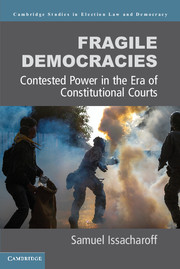Epilogue: Democratic Objectives
Published online by Cambridge University Press: 05 July 2015
Summary
Across many national settings, the recent history of constitutional courts shows the need for these courts to handle politically freighted issues on which democracy depends, and the surprising willingness of diverse political systems to accept court intervention. Particularly in the case of newly minted apex constitutional courts, the customary concern in the United States with the countermajoritarian difficulty should not and does not detain these courts. These courts were created for the express purpose of checking legislation against a constricting constitutional template.
In concluding this book, it is important not to lose sight of the overriding objective. The goal of constitutional review is not so much jurisprudential as the enabling of democratic self-governance. Constitutional judicial review is a way to keep the politically powerful from derailing the experiment in democracy. As expressed by my colleague Stephen Holmes in an early assessment of democratic transitions after the fall of the Soviet Union, democracies cannot function if the core objectives of the polity are not entrenched beyond immediate political challenge. This is the constraining role of the constitutional compact. Such constitutional constraints are “enabling” in the sense that public confidence against tyranny allows positive authority to be vested in government institutions because they are less likely to be captured for illegitimate ends. But like all institutional arrangements, constitutional limits are imperfect. A constraint is not an absolute prohibition, and risks remain.
Democracies may succumb to passion, to the momentary whims and desires of majorities, to forces not readily controlled within the normal majoritarian processes of governance. Understanding the frailties of democratic governance goes back to the remarkable accounts of Thucydides regarding the inability of classical Athens to resist popular demands for ill-fated military adventures, including the doomed attack on Sicily. Modern constitutional scholarship has picked up the theme well formulated by John Hart Ely as a matter of institutional distrust.
- Type
- Chapter
- Information
- Fragile DemocraciesContested Power in the Era of Constitutional Courts, pp. 279 - 290Publisher: Cambridge University PressPrint publication year: 2015
- 1
- Cited by

